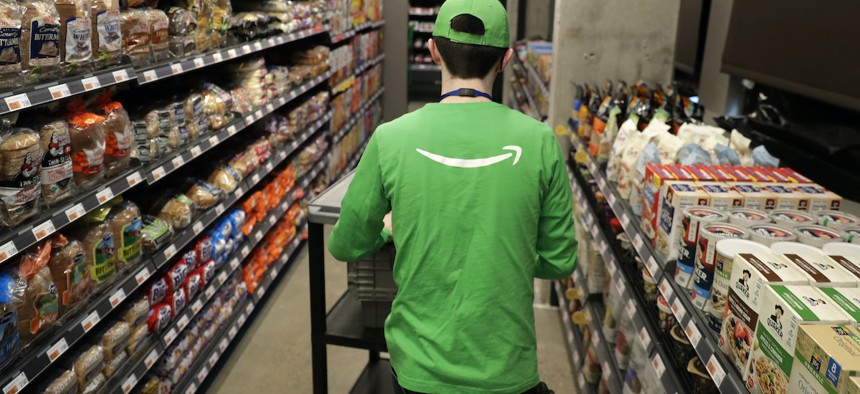Grocery Groups Sue Over Mandated Hazard Pay for Workers

In this Feb. 21, 2020 photo, a worker pushes a cart inside an Amazon Go Grocery store set to open soon in Seattle's Capitol Hill neighborhood. Associated Press
Two industry trade groups sued the city of Seattle over a new law requiring a $4-per-hour hazard pay raise.
Two grocery industry trade groups in the Pacific Northwest filed a lawsuit against Seattle last week, asking a federal judge to void the city's new law that mandates hazard pay raises for store employees.
The suit, filed in a federal district court by the Northwest Grocery Association and the Washington Food Industry Association, alleges that the law interferes with existing agreements between stores and unions. It also “picks winners and losers,” the complaint says, by singling out “large grocery companies with unionized workforces...without providing any reasonable justification for the exclusion of other employees or frontline retail workers.”
The law, passed two weeks ago, requires grocers with locations larger than 10,000 square feet and with more than 500 employees worldwide to provide a $4 per hour hazard pay increase to workers through the end of the city's civil emergency. The ordinance also applies to stores with more than 85,000 square feet if at least 30% of the floor space is dedicated to groceries. It does not apply to convenience stores or food marts “primarily selling a limited line of goods.”
Those specifications are part of the problem, the trade groups allege. Requiring hazard pay for grocery workers but not other essential employees “violates the equal protection and contract clauses of the U.S. and Washington constitutions,” the complaint says.
The law also “intrudes upon zones of activity in the areas of labor relations, union organizing and collective bargaining,” the complaint says, which are “reserved under federal labor law.”
By doing so, “the city council has inserted itself into the collective-bargaining process, which it has no legal right to do,” the trade associations said in a statement.
“Unfortunately, the council’s unprecedented ordinance, its unilateral action, and unwillingness to work with the grocery industry has left us with no other option than to file a lawsuit against the city,” Tammie Hetrick, president and CEO of the Washington Food Industry Association, said in a statement. “The expense of the new ordinance will have a number of negative consequences for the community, including fewer jobs for grocery workers and higher grocery costs for consumers at a time when they can least afford them.”
Seattle Mayor Jenny Durkan urged the groups to reconsider the suit, saying in a tweet they should “pay the workers, not the lawyers.”
“Grocery workers have been our lifeline during Covid-19,” she said. “Cities across the country have passed hazard pay because it is the right thing to do for our workers.”
Seattle’s ordinance is similar to laws passed recently in a number of California cities, including Berkeley, San Francisco, Los Angeles, Oakland and Long Beach. In response to the policies, Trader Joe’s raised pay for its employees nationwide, while Kroger opted to close some stores entirely, USA Today reported
“As a result of the City of Long Beach’s decision to pass an ordinance mandating Extra Pay for grocery workers, we have made the difficult decision to permanently close long-struggling store locations in Long Beach,” Kroger said in a statement. "This misguided action by the Long Beach City Council oversteps the traditional bargaining process and applies to some, but not all, grocery workers in the city."
The California Grocers Association filed a similar lawsuit over the Long Beach policy, according to the newspaper.
Kate Elizabeth Queram is a staff correspondent for Route Fifty and is based in Washington, D.C.
NEXT STORY: Another Big Company Plans for Remote Work Beyond the Pandemic





